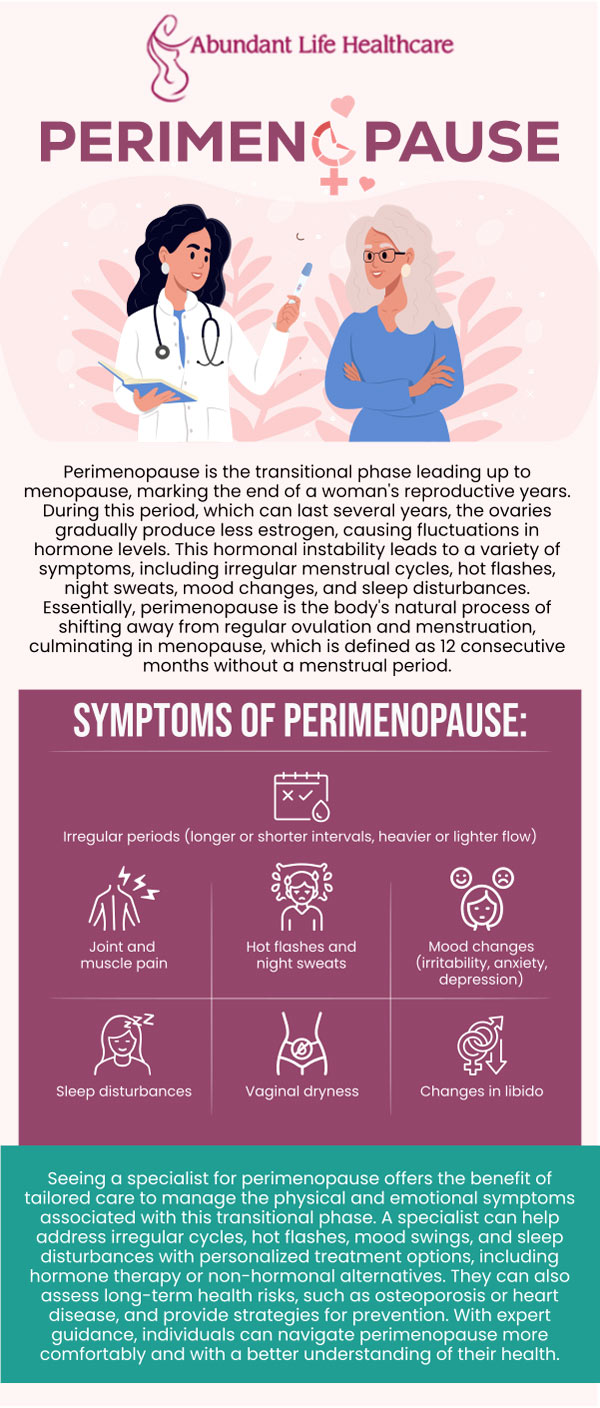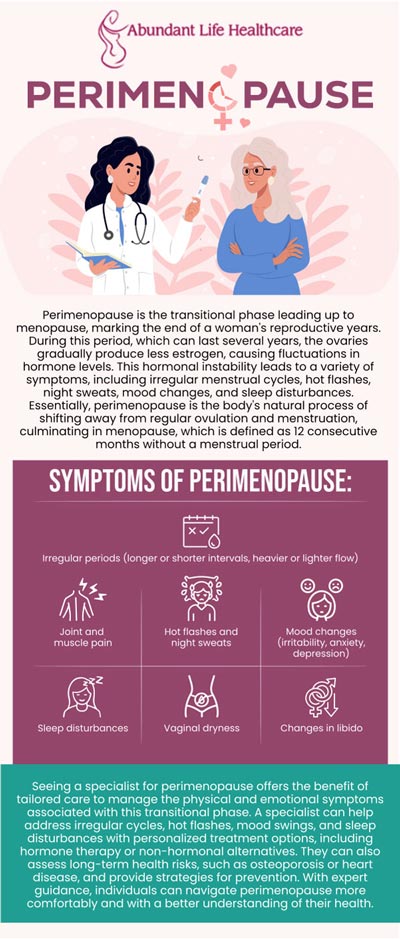Perimenopause – Symptoms and Causes
Perimenopause is the phase leading up to menopause, where hormonal fluctuations cause symptoms such as hot flashes, irregular periods, and mood swings. At Abundant Life Healthcare, Dr. Jean-Gilles, DO, FACOG offers guidance and support to help women manage these changes and maintain their health during this natural transition. For more information, contact us today or book an appointment online. We are conveniently located at 601A Professional Drive, Suite 370, Lawrenceville, GA 30046.


Table of Contents:
What is perimenopause and when does it usually begin?
Can perimenopause cause changes in menstrual cycles?
What factors contribute to the onset of perimenopause?
How long does perimenopause typically last before menopause?
Personalized Care for Your Perimenopause Journey with Dr. Jean-Gilles
Perimenopause is the transitional phase that leads up to menopause, during which the ovaries gradually begin to produce fewer hormones such as estrogen and progesterone. This shift develops over time, creating a stage marked by noticeable physical and emotional changes. Many women begin perimenopause in their forties, although it can sometimes start earlier depending on individual health and family history. The onset of perimenopause varies on an individual basis, and the timing is often influenced by genetics and overall health. While some women may notice subtle symptoms in their late thirties, others may not experience significant changes until their mid to late forties. Specialists at Abundant Life Healthcare often evaluate symptoms alongside hormone levels to provide a clearer picture of where an individual may be in the transition.
During this stage, the body undergoes fluctuations that prepare for the eventual end of menstrual cycles. The gradual hormonal decline marks the beginning of changes that many women associate with menopause, though menopause itself is not reached until menstrual cycles have stopped for a full year. Perimenopause can last several years, with its start influenced by a range of factors from family history to lifestyle choices.
Changes in menstrual cycles are one of the most common signs that perimenopause has begun. Periods may become irregular, with cycles that shorten, lengthen, or sometimes skip altogether. Flow can also change, becoming heavier or lighter from month to month, and spotting between periods may occur as hormone levels shift. These menstrual changes result from fluctuations in estrogen and progesterone, which directly affect the ovaries and the uterine lining. Because hormone production does not decline steadily but instead rises and falls unpredictably, cycles can become more difficult to track during this phase. Some individuals may also experience stronger premenstrual symptoms, while others may feel a reduction in symptoms that had previously been consistent. By assessing overall health and hormone patterns, providers can help patients understand whether these changes are part of perimenopause or related to another condition that requires attention.
The onset of perimenopause is largely influenced by age, as hormonal reserves naturally decline over time. However, genetics also play a significant role, with family history often providing insight into when an individual may expect this transition to begin. Lifestyle factors such as smoking, nutrition, and stress management can further impact timing and severity of symptoms. Certain health conditions may also contribute to an earlier onset of perimenopause. For example, autoimmune disorders, surgical removal of the ovaries, or treatments such as chemotherapy can bring about hormonal changes more quickly. These influences highlight the fact that while age is the most common factor, the path toward menopause is highly individualized.
At Abundant Life Healthcare, specialists often consider both medical history and current health status when evaluating the factors at play. By taking a holistic approach, they can provide guidance on how lifestyle adjustments and proactive care may support patients as they move through this stage of life. This personalized attention helps create a clearer understanding of what is happening within the body and what to expect in the years ahead.
Perimenopause can last anywhere from a few years to a decade before menopause is reached. On average, many women experience perimenopause for about four to eight years, though this varies depending on hormonal changes and overall health. The length of time is influenced by how quickly the ovaries reduce hormone production, and symptoms can shift in intensity throughout this period. During the early years of perimenopause, symptoms may appear sporadically, with irregular cycles being the most obvious change. As the body moves closer to menopause, symptoms such as hot flashes, night sweats, and mood shifts may become more consistent. The final stage of perimenopause ends once menstruation has stopped completely for twelve consecutive months, marking the official start of menopause.
Because perimenopause can be a lengthy and sometimes unpredictable process, individualized care ensures that patients receive the guidance and reassurance needed at each stage. This approach helps individuals better understand the changes they are experiencing and provides tools to navigate the journey with confidence.
At our clinic, your perimenopause journey is guided by the compassionate and comprehensive expertise of Dr. Jean-Gilles, DO, FACOG. As a board-certified OB/GYN and a member of the American Congress of Obstetricians and Gynecologists, he brings a wealth of specialized knowledge to women’s health. Dr. Jean-Gilles is not only skilled in managing the common symptoms of perimenopause, such as hot flashes and mood changes, but he also takes a holistic approach to your care. He is dedicated to listening to your unique concerns and developing a personalized treatment plan that may include hormone therapy, lifestyle recommendations, or other targeted solutions. His goal is to empower you to navigate this significant life transition with confidence, ensuring you feel well-informed and comfortable with every step of your journey toward wellness.
Visit Abundant Life Healthcare to learn more about perimenopause and receive expert care to manage symptoms effectively. For more information, contact us today or book an appointment online. We are conveniently located at 601A Professional Drive, Suite 370, Lawrenceville, GA 30046. We serve patients from Lawrenceville GA, Suwanee GA, Snellville GA, Duluth GA, Dacula GA, Lilburn GA, Loganville GA, Auburn GA, and surrounding areas.
Check Out Our 5 Star Reviews


Additional Services You May Like

Additional Services You May Like
- Obstetrics
- Pregnancy
- Gynecologist
- Birth Control
- Labiaplasty
- Microblading
- Weight Loss
- Semaglutide GLP-1
- Pap Smears
- Pelvic Pain
- Laser Hair Removal
- In House Ultrasound (Including 3D)
- Vaginal Birth After C-Section (VBAC)
- Pregnancy As High Risk
- Multiple Gestations
- Postpartum Counseling
- 24hour/365days On Call Service
- Annual Exam
- Abnormal Uterine Bleeding
- Management Of Endometriosis
- Ultrasound
- Pelvic Organ Prolapse
- Urinary Incontinence
- Perimenopause And Menopause
- Sexual Dysfunction
- Fat Freeze (Like Cool Sculpting)
- Body Contouring
- Ozempic
- Civil Surgeon
- Hormone Replacement Therapy
- Immigration Medicine
- Biote Hormone Pellets
- GLP-1
- Peptide Therapy




